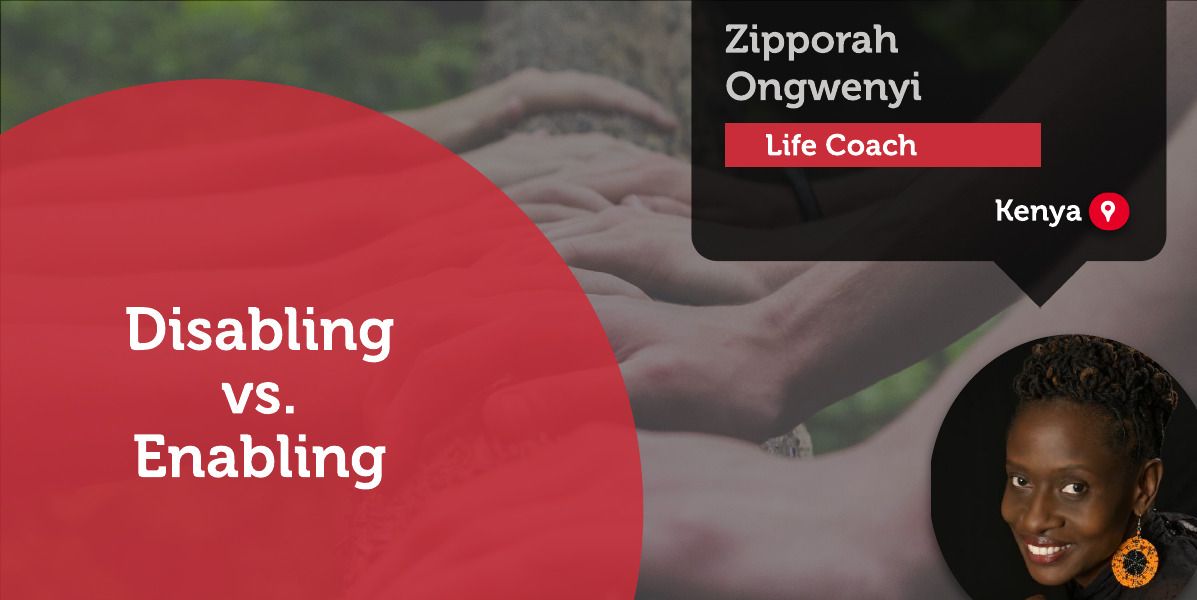A Coaching Power Tool By Zipporah Ongwenyi, Life Coach, KENYA

Disabling vs. Enabling What’s the Difference?
We learn many things as we grow up. One of our first teachers is our parents, and our immediate family, followed by the extended family. Over time, we also get to interact with teachers in school, friends, and peers. Throughout, we pick up ideas that form our understanding of the world, about the culture that we live in. Some of these ideas enable us to live out healthy and fulfilling lives, while others only serve to disable us and bring so much friction in our lives, preventing us from getting to a place we all deserve to be having a sense of peace and being in concert with life.
Disabling
The oxford dictionary describes disabling as ‘having the effect of putting something out of action’. Another definition it offers is ‘(of a condition or injury) limiting a person’s movements, senses, or activities.’ Some of the experiences we go through in life, and the things we learn as a result may put us in a state that limits how we interact with the world around us. Sometimes we find that we are ‘frozen’, and honestly think that there is absolutely no way to get out of the situations we may find ourselves in. We may see ourselves as unable to do anything at all, and by that, we can easily surrender our agency to other people even though we may not be sure as to whether they will make decisions in our interest. This leads to anger when we don’t agree with decisions taken on our behalf. Often, our self-esteem will plummet, and gradually, we lose our voices.
Enabling
The oxford dictionary describes enabling as ‘give (someone) the authority or means to do something; make it possible for.’ Another definition is ‘make a device or system operational; activate.’ Rather than limit us to the ideas and views of others, and their definitions of us, we can have the authority in our own lives and choose to define for ourselves what we want in any given situation, in our terms. We are then in a place to activate ourselves and pull ourselves out of any rut that we may have slowly gotten ourselves stuck in over some time. We take ownership of our decisions, and their outcomes, because we believe that innately, no one would know what is best for us than ourselves.
To Create New Possibilities and Futures Disabling vs. Enabling
Lao Tzu said, “Watch your thoughts, they become your words; watch your words, they become your actions; watch your actions, they become your habits; watch your habits, they become your character; watch your character, it becomes your destiny.”Several clients seeking help to improve key areas of their lives are usually informed by something in the past that has grown over time and solidified an affirmation they now believe to be true about themselves. Like relentless water that successfully cuts into a firm rock over with its persistence in many years, so do thoughts that persist and that with time gain a life of their own. Often, these thoughts and beliefs learned through the years are not of affirmation. Rather, they are very disabling such that even when a course of action beneficial to a client is explored, it may take time for the client to believe that truly they do have the power to unleash their potential. Allowing themselves the authority to do something about their situation puts people in an enabling space where they begin to look back and acknowledge patterns formed over time, and as such are willing to unlearn what they have learned through years to create new possibilities and futures for themselves.
Explore Disabling
The questions to be asked around disabling include:
- What informs the values and beliefs you hold?
- What makes them important?
- How do they serve you?
- What level of agency do you hold?
- What power do you have over the situation?
- What are some of your biggest fears?
Explore Enabling
The questions to be asked around enabling include:
- What could you do if you were not afraid?
- What would be in charge mean for you?
- How would you describe your ideal self?
- What can you do on your terms?
- What aspects of your life would you change?
Self-Accountability
It is easy to blame others for the situations we find ourselves in because taking ownership can be scary. Taking ownership sometimes also makes us feel like we have failed, and it is hard to accept that of ourselves. The victim mentality however disables us and we stand the danger of becoming perennial whiners. Taking charge of our situations and accepting the roles we might have played in them puts us in a place where we can be accountable to ourselves and in an enabling place that allows us to chart our destinies.
References